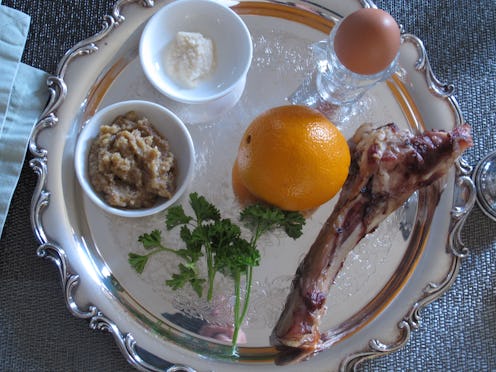Life
5 Tips To Celebrating Both Passover And Easter

Nearly five years ago, I started dating the love of my life. But from the get-go, I knew that celebrating holidays was going to be an adventure: he’s Jewish and I’m not. We’ve had an easier go of it than others because neither of us is religious, but celebrating holidays when you're in an interfaith relationship — especially holidays like Easter and Passover that typically coincide — can be a bit tricky.
My boyfriend’s family is Reform (though they stick more to the cultural aspects of Judaism, rather than the religious), and as the daughter of an atheist and a former Catholic, religion was not something I was brought up with. I’ve always found the concept of religion and the variety of individual faiths fascinating — so much so that I decided to minor in religious studies — so I was actually excited to explore my boyfriend’s religious and cultural traditions. In fact, after learning about Judaism and being included in the holidays these last few years, I’ve decided to convert eventually.
But that is not the case for all interfaith couples. And even though I’ll be converting, I will always want to honor the holiday traditions of my family that I grew up with.
The most basic tip I can give is for both of you to be open-minded. You should both be experiencing and learning new things, so it’s important to have an open line of communication and feel safe while charting new territory. And remember: holidays are supposed to be fun (or at least enjoyable), so don’t stress out too much!
1. Talk About What Will Actually Be Celebrated And How
This is probably the first discussion you should have with your significant other before any dual holidays roll around. For instance, I personally don’t celebrate Easter anymore — I’m not religious, and I’m a little too old for egg hunting — but my family does, so we’re still invited to join. And even though we won't be attending any Easter celebrations, I still like to paint eggs on occasion. My boyfriend’s family does celebrate Passover with a Seder, and it’s important to all that we attend. Talk with your guy or gal about which holidays you actually want to celebrate and how you want to celebrate them, so that you can plan for one or both accordingly.
2. Learn About The Holidays From The Source
Now that you’ve established which holidays you want to celebrate, take some time to actually learn about the traditions you’re about to experience. Of course, you can Google what is supposed to happen during a Christmas Mass or Passover Seder, but the best source of information about what will actually happen is your significant other. Just like every family is different, every family probably celebrates their holidays and traditions differently. My boyfriend’s family, for example, does not go to Temple for Pesach service, and they do a much shorter and funnier Seder dinner. I would still suggest doing your own background research on the meaning and origin of the holiday, however.
3. It’s Totally OK To Not Know What To Do
The first Passover dinner I spent with my boyfriend and his family — I had no idea what was happening. I knew the story of Passover primarily from the King of Egypt and the one World Religions class I’d taken before then, but I didn’t know any of the songs or about the Seder plate or Elijah or the afikomen. That was totally OK. I’m sure my boyfriend would have felt just as lost if I’d taken him to my cousin’s Mormon church (admittedly, I’d feel lost there, too). Yeah, it can be a little embarrassing and frustrating not to know things everyone else does, but you’ll learn!
4. Get Involved, And Involve Your SO
Of course, the best way to learn a new tradition is to get involved with it. My first Hanukkah, I didn’t know the prayers, but I listened as my boyfriend's family said them, and they still wanted me to help light the menorah. Now, four Hanukkahs later, I can say the prayer in my sleep. And like I said, not knowing something can feel awkward, so make sure to involve your SO in your traditions in some way. I might not know all the recitations in Hebrew, but I can still read from the English translation of the Passover Haggadah. On my end, I ask my boyfriend to help me decorate our Chistmukkah tree every year, since it’s what I did with my family growing up.
5. Give Equal Time And Attention To Both Holidays
This is where it can get really tricky, especially for these dual holidays. Hanukkah and Christmas and Pesach and Easter have the tendency to fall around the same days some years, which can make celebrating both difficult. The first year I wanted to get a Christmas tree, my boyfriend was opposed, even though I had agreed to celebrate Hanukkah with him and his family and have a menorah in our house. But even though Christmas and a Christmas tree weren’t a part of his traditions, they were important to me, just like the menorah was important to him. We’ve gotten a tree every year we’ve been together, just as we’ve lit our menorah candles every year.
You’ll probably have to do a lot of compromising — we usually do Christmas Eve, Christmas Day, and Boxing Day with my family, and as many Hanukkah days as we can with his — but it’s important that you both respect the other’s holidays and traditions even if it’s not what you’re used to. You don’t want to feel like you’re giving up your own traditions to focus on your SO’s, because that will just breed bitterness. And if you or your SO isn’t willing to compromise, that’s a different, very important conversation to have.
Images: Eden Hensley Silverstein/Flickr; Giphy (6)